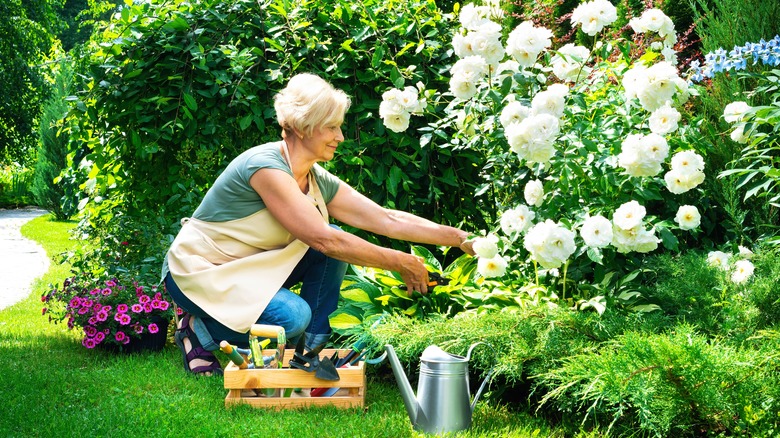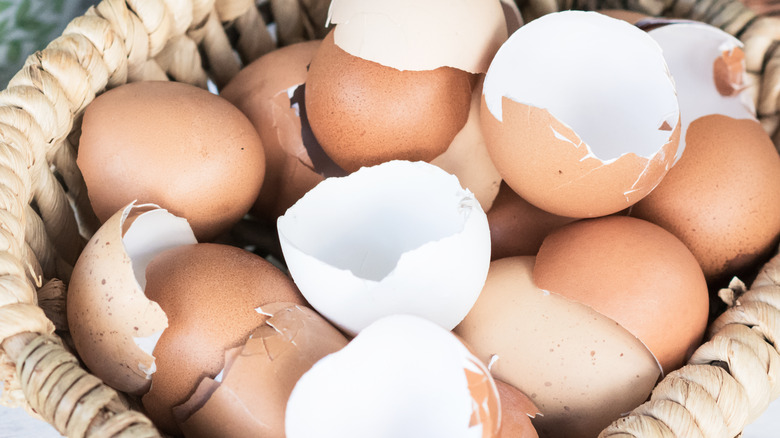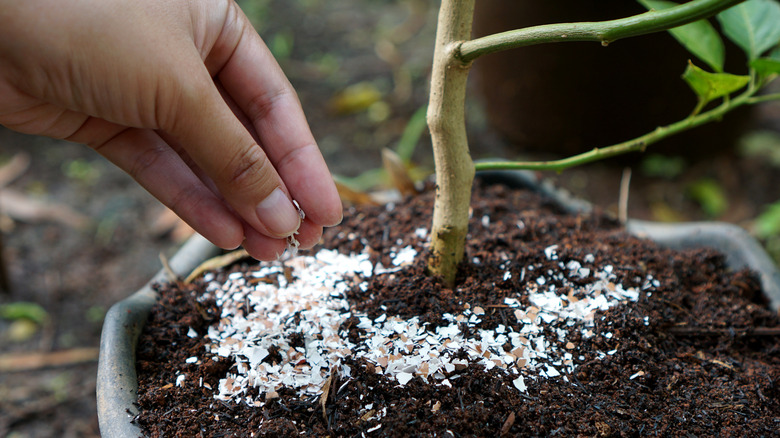Should You Add Eggshells To Your Rose Garden?
You're willing to do anything for bigger roses: save your leftover banana peels, spray the plants with milk ... all that endless deadheading and pruning. What about setting aside eggshells after cracking the innards into the frypan at breakfast? Some people claim that these casings can add essential nutrients to the soil around your plants (especially calcium), balance pH levels, and even deter pesky pests. However, it's not all sunny-side up, as other garden gurus have debunked some of these claims. Here's the gist: If you want to use eggshells to repel pests or immediately boost your rose's calcium levels, you shouldn't add them to your garden. However, eggshells might help with calcium deficiencies over time.
If you're dealing with a slug and snail infestation on your roses, you may have heard that crushed eggshells can stop them in their slime-filled tracks, since they have a sharp feel. Some also believe that these shells can repel cats from your garden, too. What's more, a single eggshell is almost all calcium carbonate along with other trace elements including phosphorus, potassium, and sulfur, which, the idea goes, transfer to roses when you add eggshells to your soil. Just like most other plants, calcium is essential for roses, and a deficiency in this element indicates low pH soil. If you've spotted yellow, curling, falling leaves and long stems with little foliage, this may be a sign that your roses have a calcium deficiency. But will adding eggshells to the soil benefit your plants?
Pest control or calcium booster?
Experts have debunked the idea that slugs and snails hate crushed eggshells. Instead, they glide right over them. Further, the white skin inside the shell smells as it rots, and that scent is a hungry slug magnet. In an experiment by All About Slugs, a lettuce leaf surrounded by eggshells was consumed by slugs faster than one that wasn't. Experts at the Elizabeth C. Muller Library — the specialist horticulture library at the University of Washington — denounce the cat repellent idea, too: eggshells have never been proven to stop them and, worse, may attract other birds and pests. Therefore, eggshells likely won't keep pests away from your roses.
However, could providing your roses with calcium be one of the unexpected uses for eggshells around your home and garden? Experts insist that the calcium in eggshells helps roses grow more vigorous root systems, develop more resilient cellular structures, and better withstand infections. Plus, eggshells change pH levels in the soil more slowly than commercial additives like agricultural lime — meaning they impact soil health for longer. But you can't just throw a bunch of cracked halves around your roses and expect them to do their job immediately. It takes about two years for a whole eggshell or three to seven months for crushed eggshells to break down through natural weathering and microbial activity. Only then is the calcium it contains available to plants. So, while eggshells can be beneficial, don't expect them to work immediately.
Channel your inner garden scientist
If you're inclined to novelty in gardening, a little experimenting might be worthwhile. At the least, you'll save a bunch of eggshells from the trash can. To boost your garden's growth with this calcium-rich DIY eggshell fertilizer, begin by washing the eggshells and sun-drying them to kill pathogens like salmonella. Then, grind the shells into a fine crumb or powder using a coffee grinder, food processor, or blender — or a mortar and pestle if you prefer an off-grid option. This extra step is well worth the effort. As mentioned above, experts say it helps to release the calcium in the shells and make it available to your hungry roses faster and for longer.
Sprinkle the crushed shells on the soil at the base of your roses or drop a handful into the bottom of planters before potting up new bushes. You could also add the fine powder to a watering can (and water your roses with the amended liquid), a spray bottle (to create a foliar spray), or your compost. There's no limit on how much crushed or powdered eggshell you can use, so don't worry about being too liberal in your application. Store any leftover shells or powder in a sealed container to keep them fresh and critter-free. Here's a bonus tip to get the most out of your eggshells: Reserve the water left over from boiling eggs, let it cool, and give 2 cups to each plant in place of your regular watering.


